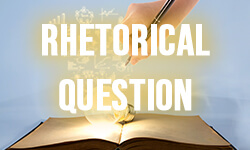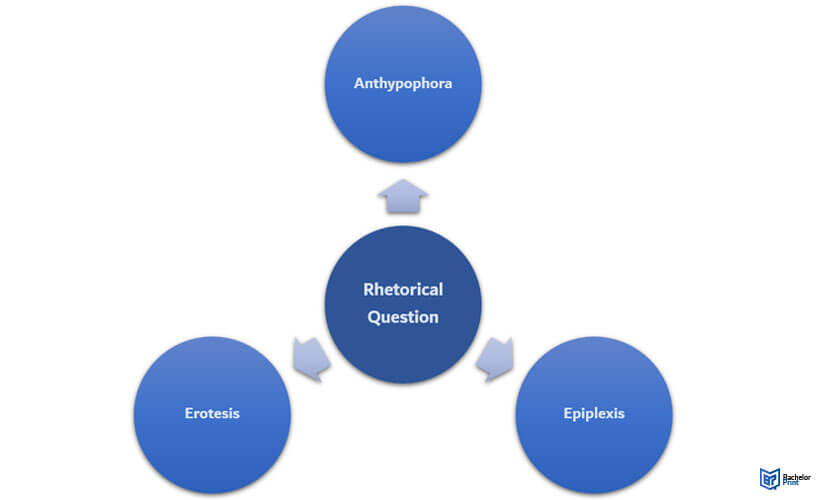
In the study of language, a rhetorical question is recognized as a figurative inquiry employed in dialogue, not with the expectation of a response, but to highlight a point, provoke thought, or underscore a declaration. This stylistic device is not aimed at gathering information but serves to draw attention, stimulate contemplation, or reinforce an argument. This type of loaded question is a common and effective tool in the realms of literature, marketing, debates, and daily communication.
Definition: Rhetorical question
The word rhetorical has its origin in the Greek language as “rhetorikos,” meaning “skilled in speaking.” It is a figure of speech in the form of a question posed for stylistic and dramatic effect rather than to elicit an answer. Unlike regular questions, which seek information or clarification, rhetorical questions are used to make a point, persuade, provoke thought, or create a dramatic effect.
They are designed to encourage the listener or reader to consider the implied answer within the context of the question itself, rather than to respond verbally. They are commonly used in literature, speeches, and everyday conversation to emphasize a point, express irony, or to lead the audience towards a particular conclusion. When talking about academic writing, rhetorical questions have no place in it since they are used for creative flair instead of clarity.
Examples
Rhetorical questions are employed across various contexts to engage audiences, provoke thought, emphasize points, or express emotions. Below you will find examples in different contexts and their functions.
Here are common example sentences used in daily communications.
Rhetorical questions in literature are often used to provoke thought, emphasize themes, or convey the characters’ emotions succinctly. Here are some short popular examples from various literary works.
Below you’ll find several examples that could be seen in marketing and media.
In speeches and debates, especially of political nature, rhetorical questions can be used to provoke an audience’s thoughts and guide them to a specific answer.
The 3 Types
Rhetorical questions can be categorized based on their purpose and the effect they aim to achieve. Here are three types, each serving a distinct function in discourse.
| Types | Definition | Examples | Function |
| Anthypophora/ hypophora |
Question that immediately answers itself. | What do we stand for? We stand for freedom, justice, and equality for all. | Control the discussion and guide thoughts in a specific direction before any objections arise. |
| Epiplexis | Question used to challenge the audience. | Do you call this justice, to let the guilty walk free while the innocent suffer? | Criticize or condemn to provoke the audience and make them reflect on their actions or beliefs. |
| Erotesis | Question used to evoke a strong reaction. | How can we expect to achieve peace by continuing to prepare for war? | Persuade or convince the audience by highlighting the obviousness or absurdity of the situation. |

Effect
In the world of communication and rhetoric, rhetorical questions are powerful tools that can have profound effects on the listener or reader. Here are some of the theoretical and psychological impacts they have, along with plenty of examples.
1. Engagement and Interest
Rhetorical questions draw the audience’s attention and engage them more deeply in the subject.
This question invites the audience to reflect personally on the concept of a good life, making them more invested in the ensuing discussion.
2. Emphasis
They emphasize a point or highlight an issue, making it more memorable or striking.
By questioning the importance of free speech, the speaker underscores its critical role in democracy.
3. Provoking Thought
Rhetorical questions encourage the audience to think critically and reflect on their beliefs or assumptions.
This question, derived from biblical context, prompts deep contemplation about the value of material vs. spiritual wealth.
4. Expressing Irony or Sarcasm
They can convey irony or sarcasm, critiquing a situation without directly stating the criticism.
Used in a context where time is clearly limited, this question sarcastically comments on the unrealistic expectations of having ample time.
5. Creating a Persuasive Argument
Rhetorical questions can strengthen a persuasive argument by leading the audience to an intended conclusion.
This question implies that the cost of inaction is too high, persuading the audience towards recognizing the urgency of environmental issues.
6. Building Connection
They can create a sense of connection and rapport by involving the audience in the conversation.
This question resonates with common human experiences, building a bond with the audience.
7. Challenging Assumptions
Rhetorical questions challenge the audience to reconsider their assumptions or preconceived notions.
By questioning the application of this principle, the speaker invites reconsideration of societal equality and justice.
8. Expressing Frustration
They can express frustration, disbelief, or incredulity about a situation or behaviour.
This question expresses frustration over the prolonged discussion of what the speaker perceives as an obvious or resolved matter.
Benefits & Problems
Since we have already discussed possible effects, these questions can offer several benefits in communication, but they also come with potential drawbacks. Understanding both can help in effectively leveraging rhetorical questions for desired outcomes.
Benefits
Below, you’ll see several advantages rhetorical questions can offer.
1. Engagement
They engage the audience by encouraging them to think about the question and its implications, making the communication more interactive and thought-provoking.
2. Emphasis
Rhetorical questions are excellent for emphasizing a point or highlighting an issue, making the message more memorable and impactful. They’re especially useful for headlines.
3. Persuasion
By leading the audience to consider a question and its obvious answer, rhetorical questions can be powerful tools in persuasion, subtly guiding the audience to agree with the speaker’s viewpoint.
4. Creating Drama
They can add dramatic effect or intrigue to a speech or writing, capturing the audience’s attention and maintaining their interest.
5. Facilitating Reflection
Rhetorical questions encourage reflection and critical thinking, prompting the audience to ponder deeper meanings and implications.
Problems
While there are numerous advantages, disadvantages can also arise when using rhetorical questions that may make you consider using them.
1. Misinterpretation
If the implied answer is not clear to the audience, rhetorical questions can lead to confusion or misinterpretation, potentially diluting the message’s effectiveness.
2. Overuse
Frequent use of rhetorical questions can become tiresome and may diminish their impact, leading to disengagement or annoyance among the audience.
3. Perceived Condescension
Some audiences may perceive rhetorical questions as patronizing or condescending, especially if the implied answer seems to undermine their intelligence or opinions.
4. Cultural Differences
The effectiveness of rhetorical questions can vary significantly across different cultures. In some contexts, they might not be as easily understood or appreciated, affecting the communication’s impact.
5. Undermining Directness
In situations where direct communication is valued or necessary, relying too much on rhetorical questions can obscure the message, making it less straightforward and harder to grasp.
Rhetorical Question vs. Leading Question
A leading question (also, suggestive question) is a question that prompts or encourages the desired answer. It’s often used in legal contexts, interviews, or surveys to guide the respondent towards a specific response, sometimes subtly implying it.
The key difference lies in their intent: rhetorical questions aim to engage thought or emphasize a point without expecting a response, while leading questions seek to elicit a specific response, steering the conversation or testimony in a desired direction.
numerous advantages for Canadian students:
- ✓ 3D live preview of your configuration
- ✓ Free express delivery for every order
- ✓ High-quality bindings with individual embossing

FAQs
It is a question that is asked for a specific purpose rather than obtaining information.
“How should I know?” is a question that shows frustration, while expecting no answer.
Rhetorical means that it is made for style or effect, meaning a rhetorical question is used for mere effect, rather than an answer or information.
